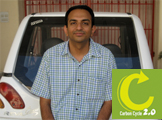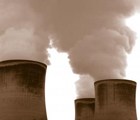


 As humans emit more carbon into the atmosphere than the planet's natural processes are able to remove, the Earth's carbon cycle is increasingly out of balance. In an effort to restore balance, researchers in the Berkeley Lab's Computational Research Division have received INCITE computing allocations on two of the world's most powerful supercomputers to explore the viability of carbon-neutral technologies, like nano solar cells and near-zero emission combustion devices. More>
As humans emit more carbon into the atmosphere than the planet's natural processes are able to remove, the Earth's carbon cycle is increasingly out of balance. In an effort to restore balance, researchers in the Berkeley Lab's Computational Research Division have received INCITE computing allocations on two of the world's most powerful supercomputers to explore the viability of carbon-neutral technologies, like nano solar cells and near-zero emission combustion devices. More>
 "This Week in Batteries" is a newly launched blog hosted by Venkat Srinivasan of the Environmental Energy Technologies Division. "…I think we can all agree that humans would be better off if we cut back the amount of CO2 that we put into Earth's atmosphere, and that reducing our dependence on oil is one big step toward that. Improved batteries are a fundamental element of enabling this, whether for transportation or for power grid storage," says Srinivasan in his introductory post. A second post on "Should I get ready to buy a plug-in hybrid?" was added yesterday.
"This Week in Batteries" is a newly launched blog hosted by Venkat Srinivasan of the Environmental Energy Technologies Division. "…I think we can all agree that humans would be better off if we cut back the amount of CO2 that we put into Earth's atmosphere, and that reducing our dependence on oil is one big step toward that. Improved batteries are a fundamental element of enabling this, whether for transportation or for power grid storage," says Srinivasan in his introductory post. A second post on "Should I get ready to buy a plug-in hybrid?" was added yesterday.
 As part of the Earth Sciences Division's Distinguished Lecture Series, Paul Falkowski of Rutgers University will present a talk on "The Microbial Engines That Drive Earth's Biogeochemical Cycles." The event takes place next Friday, Feb. 19, at 10:30 a.m. in the Building 50 Auditorium. Falkowski's research interests include energy, evolution, paleoecology, photosynthesis, biophysics, biogeochemical cycles, and symbiosis.
As part of the Earth Sciences Division's Distinguished Lecture Series, Paul Falkowski of Rutgers University will present a talk on "The Microbial Engines That Drive Earth's Biogeochemical Cycles." The event takes place next Friday, Feb. 19, at 10:30 a.m. in the Building 50 Auditorium. Falkowski's research interests include energy, evolution, paleoecology, photosynthesis, biophysics, biogeochemical cycles, and symbiosis.
 In The News: Greenhouse Gas Measurements Topic of Radio Program
In The News: Greenhouse Gas Measurements Topic of Radio Program Marc Fischer, with the Lab's Environmental Energy Technologies Division, was recently featured on KQED Radio's California Report discussing the greenhouse gas-monitoring program he is part of. Measurements are being taken at a tower in the state's Central Valley in collaboration with the National Oceanic and Atmospheric Administration, as part of the California Greenhouse Gas Emission Measurement (CALGEM) project for the California Energy Commission. The goal of CALGEM is to develop the scientific information to support verification of future reductions in California's greenhouse gas emissions mandated by California Assembly Bill 32. Go here to listen to the broadcast.
 The Lab's Health Services will be offering free cholesterol screenings in Building 26 the morning of Wednesday, Feb. 24, by appointment only. This screening will follow the recommendations of the U.S. Preventive Medicine Task Force and will include a total cholesterol level and a high-density cholesterol level (HDL). Fasting is not required. Call x6266 for appointments. Screening is recommended for men over 35, women over 45, and younger adults with cardiac risk factors. "Elevated cholesterol is one of the key risk factors for heart disease," said Peter Lichty, the Lab's Medical Director. "Those with elevated levels will get advice on what steps to take to reduce their risk." More>
The Lab's Health Services will be offering free cholesterol screenings in Building 26 the morning of Wednesday, Feb. 24, by appointment only. This screening will follow the recommendations of the U.S. Preventive Medicine Task Force and will include a total cholesterol level and a high-density cholesterol level (HDL). Fasting is not required. Call x6266 for appointments. Screening is recommended for men over 35, women over 45, and younger adults with cardiac risk factors. "Elevated cholesterol is one of the key risk factors for heart disease," said Peter Lichty, the Lab's Medical Director. "Those with elevated levels will get advice on what steps to take to reduce their risk." More>
Lab employees who want to share their views about University of California pension and retiree health benefits can do so by filling out a short, confidential, online survey. Survey deadline is Monday, March 1. The survey takes less than 10 minutes to complete and all answers are confidential. There are separate surveys for employees and retirees. Some faculty and policy-covered staff will be randomly selected to voluntarily complete a more in-depth survey about their workforce behavior and preferences. More>
Today at Berkeley Lab encourages comments, suggestions, and story ideas. Please send them here.
TABL is produced by Public Affairs' Communications Group